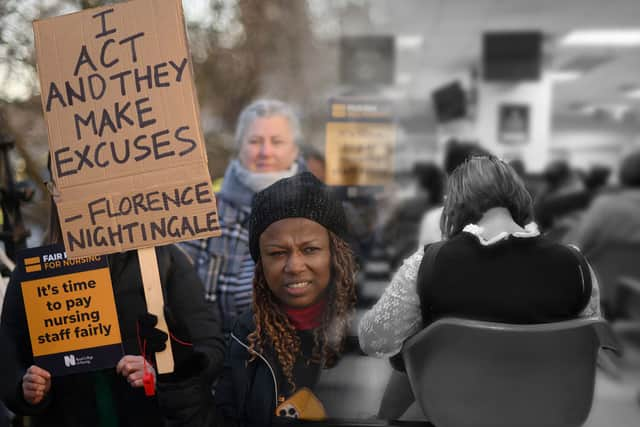Exclusive:Nurses’ strike: how NHS hospitals in England compared for cancelled operations and appointments
and live on Freeview channel 276
Strikes by nurses and other NHS workers this week caused more than 11,000 operations and appointments to be cancelled, new figures show.
The total number of procedures called off due to walkouts by healthcare workers has now surpassed half a million in the past six months, with deputy chief nurse Charlotte McArdle saying each round made it “more difficult for the NHS to tackle the backlog”.
Advertisement
Hide AdAdvertisement
Hide AdMore than 7,600 operations and appointments had to be cancelled at acute trusts due to the walkout by members of the Royal College of Nursing on 30 April and 1 May as well as action by some Unite members in certain parts of the country on 1 and 2 May. A further 3,280 community appointments and 260 appointments at mental health trusts also had to be called off.
At its peak, at least 5,000 staff were on strike - although some NHS trusts did not record data, so the number is likely to be higher.
This table shows the number of operations and appointments cancelled at each acute hospital trust in England:
The number of cancellations was far lower than the 195,000 procedures called off during the unprecedented four-day junior doctors’ strike in April. This week’s action took place on Sunday into the early May Bank Holiday Monday, when traditionally fewer operations would have been scheduled compared to weekdays.
Advertisement
Hide AdAdvertisement
Hide AdBut the walkout still had a “very significant” effect on the NHS, Prof McArdle said.
She said: “Despite the extensive efforts of NHS staff to keep patients safe and limit disruption amid the loss of thousands of vital nursing staff, this weekend’s industrial action has inevitably had a very significant impact for patients and staff.
“Across the NHS we have now seen more than half a million appointments and procedures rescheduled over the last six months as a result of strikes from staff in a range of NHS roles – and with each strike, it is becoming harder. Our staff are doing all they possibly can to manage the disruption and deliver rescheduled appointments as quickly as possible, but there’s no doubt that each round of industrial action makes it more difficult for the NHS to tackle the backlog.”


An estimated 7.2 million people were waiting to start routine hospital treatment at the end of February, the highest total since records began in 2007, according to NHS figures.
Advertisement
Hide AdAdvertisement
Hide AdThe news comes as nurses warned that strikes could continue until Christmas after rejecting the Government’s revised 5% pay offer. Because the majority of unions representing staff on the Agenda for Change contract voted in favour of the deal, the NHS Staff Council was able to recommend that the Department of Health should implement the pay offer on Tuesday.
Health Secretary Steve Barclay warned the RCN the deal was the “final offer” but the union vowed to ballot members later this month as it warned that strikes could take place across the whole NHS in England between June and December.
An RCN spokesperson said: “The impact on patients is the hardest part and nursing staff are apologetic about the situation for individual patients affected. We are taking this action, however, because every day nursing staff and patients are suffering as staff shortages affect patient safety.
“Patients and the public know that and their support is appreciated and not taken for granted. This campaign has always been about patients and a safe NHS. The Government will never tackle the backlog without nursing staff nor fill the record number of unfilled nurse jobs without paying them fairly.”
Advertisement
Hide AdAdvertisement
Hide AdUnite national lead officer Onay Kasab said its members were “clear that the offer does not go far enough to stop the recruitment and retention crisis that is collapsing the NHS”, adding: “Fresh strike action will continue to be scheduled, alongside the opening of new industrial action ballots for those NHS workers who want to take a stand against the government’s despicable dismantling of our health service.”
NHS Providers deputy chief executive Saffron Cordery said: “We’ve now seen over 542,000 patient appointments delayed due to strike action over the past six months.
“Industrial action has piled even more pressure on overstretched services already grappling with a chronic capacity crunch, soaring demand and widespread staff shortages, slowing down hard-won progress in tackling record care backlogs.
“While leaders across the NHS hope yesterday’s acceptance of a new pay deal signals an end to the most disruptive period of industrial action in NHS history, they also know more strikes could be on the horizon if talks with junior doctors, nurses and others fail.
Advertisement
Hide AdAdvertisement
Hide Ad“The number of patients who face having their care disrupted will keep rising unless the Government finds a way to sit down with unions resolve these ongoing disputes.”
Of England’s acute trusts, University College London Hospitals saw the highest number of cancelled operations, at 435, followed by Guy’s and St Thomas’, also in London, at 316 and Newcastle Upon Tyne Hospitals at 166.
Comment Guidelines
National World encourages reader discussion on our stories. User feedback, insights and back-and-forth exchanges add a rich layer of context to reporting. Please review our Community Guidelines before commenting.
